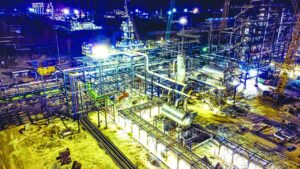 Nigeria’s President Muhammadu Buhari officially inaugurated the highly anticipated Dangote petroleum refinery, heralding a significant milestone in the country’s energy sector transformation. The grand unveiling of this groundbreaking $19 billion facility took place in Lagos, the bustling commercial hub of Nigeria, and drew distinguished guests, industry leaders, and heads of state from across Africa.
Nigeria’s President Muhammadu Buhari officially inaugurated the highly anticipated Dangote petroleum refinery, heralding a significant milestone in the country’s energy sector transformation. The grand unveiling of this groundbreaking $19 billion facility took place in Lagos, the bustling commercial hub of Nigeria, and drew distinguished guests, industry leaders, and heads of state from across Africa.
The inception of the refinery marks the realization of a visionary project initiated by Aliko Dangote, Africa’s wealthiest entrepreneur, who first announced plans for the facility back in September 2013. At that time, he secured an impressive $3.3 billion in financing to bring his ambitious endeavor to fruition.
The inauguration ceremony follows two previous attempts to commence production at the facility, both of which encountered setbacks. The first target date was October 2019, with an anticipated operational launch in 2021. However, challenges arose, pushing the timeline further. In January, Dangote reassured stakeholders that the refinery would commence crude oil processing by the third quarter of 2022.
During the inauguration address, President Buhari highlighted the refinery’s immense capabilities, revealing its capacity to process 650,000 barrels of crude oil per day. This substantial output, according to the president, will not only allow Nigeria to achieve self-sufficiency in refined products but also create a surplus for exportation. Buhari described this achievement as a momentous milestone for the Nigerian economy and a game-changer in the downstream petroleum products market, both domestically and throughout the entire African continent.
President Buhari emphasized the significance of this project, citing the longstanding economic challenges faced by Nigeria over the past decade. Factors such as inefficient economic infrastructure, a protracted insurgency, the global financial crisis, oil price collapses, the COVID-19 pandemic, and the Russia-Ukraine war have severely impacted the nation’s economy. These factors have placed considerable strain on the government’s ability to provide essential infrastructure without resorting to substantial borrowing.
To address these challenges, Buhari asserted that the government has prioritized creating an enabling environment for the private sector to thrive and bridge the substantial investment gap in critical sectors. The president recognized the indispensable role of active private sector participation and robust public-private partnerships in driving the Nigerian economy forward.
The Dangote Petroleum Refinery, situated on a vast expanse of 2,635 hectares in the Dangote Industries Free Zone within Lagos’ Ibeju-Lekki district, boasts a workforce of over 100,000 individuals. With a capacity to process 650,000 barrels of oil per day, the refinery is poised to propel Nigeria’s transition from an oil-rich nation heavily reliant on imports to a self-sufficient producer of petroleum products.
The facility is expected to fulfill 100 percent of Nigeria’s domestic demand for various refined products, including gasoline (53 million liters per day), diesel (34 million liters per day), kerosene (10 million liters per day), and aviation fuel (2 million liters per day). Moreover, it aims to generate surpluses of these products for exportation. Designed to accommodate 100 percent Nigerian crude, the refinery also possesses the flexibility to process other types of crude oil.
The inauguration of the Dangote petroleum refinery stands as a momentous occasion, signaling Nigeria’s determined efforts to overcome economic challenges through strategic investments and fostering an environment conducive to private sector growth. With its far-reaching impact on the Nigerian economy and the broader African continent, this extraordinary venture represents a significant step toward a more self-reliant and prosperous future for the nation.

Ajayi Agboola Emerges PDP Flagbearer For Ondo November Gubernatorial Election
119 Inmates Escape As Storm Damages Suleja Custodial Centre
Tinubu Launches Consumer Credit Scheme To Empower Working Nigerians
Federal Government Takes Action: Revokes 924 Dormant Mineral Licences